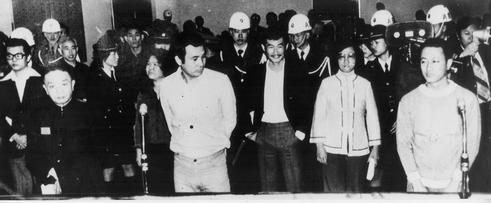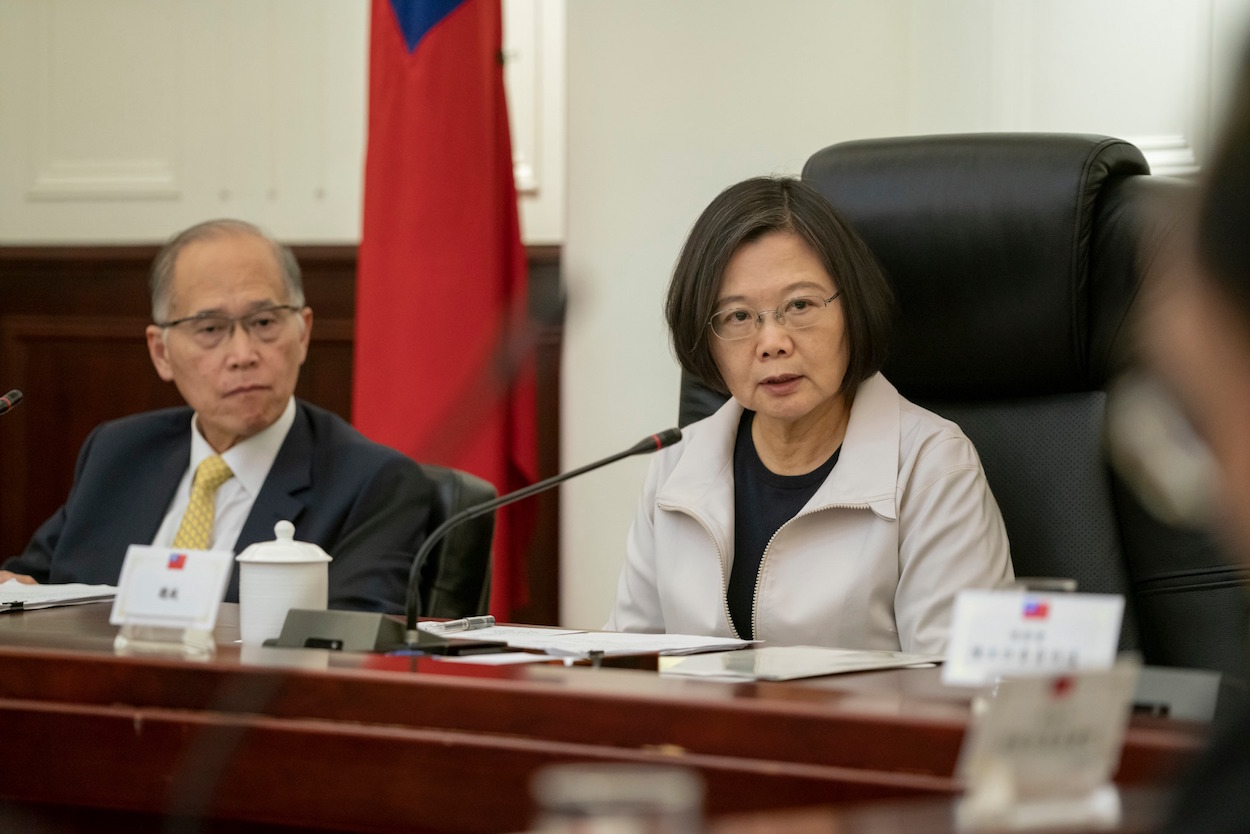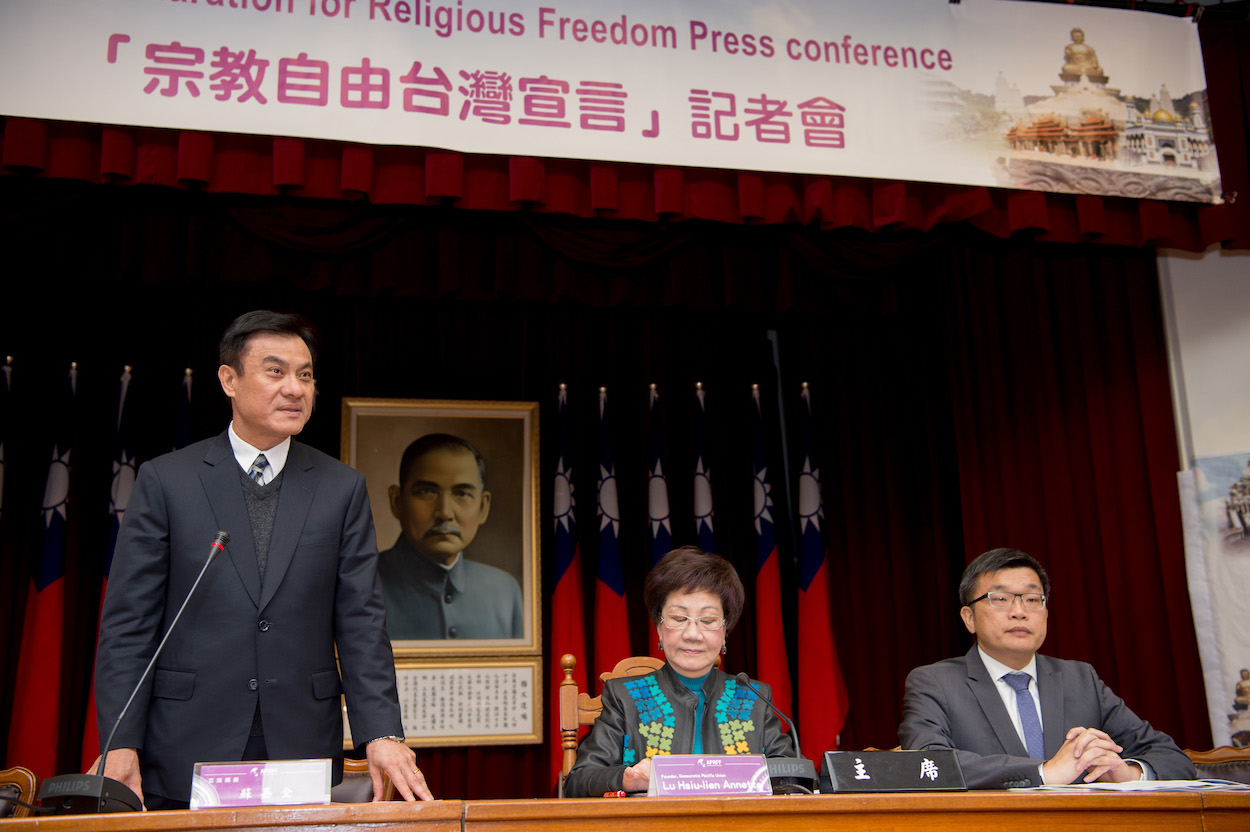by Brian Hioe
語言:
English
Photo Credit: VOA/Public Domain
Despite A History of Activism, Starkly Conservative Politics in the Present
ANNETTE LU proves the perfect illustration of how many of yesterday’s revolutionaries have become today’s reactionaries in contemporary Taiwan. In fact, that individuals such as Lu or many others of her generation continue to be involved in contemporary Taiwanese politics ultimately threatens the future of Taiwan itself, in significantly increasing the likelihood of splits in the pan-Green camp in a manner that could result in a KMT victory.
Though not currently holding any political position, Lu announced on Monday that she would run as the presidential candidate of the Formosa Alliance, a recently formed third party primarily consisting of elderly pro-independence hardliners. Although some might dismiss Lu not having actual impact on the 2020 presidential election, the race seems likely to be a close one, in which even a one or two percent difference in votes could lead to a KMT victory instead of a DPP one. While President Tsai Ing-wen now enjoys a clear lead in recent polls, past polling has shown Tsai neck and neck with Han Kuo-Yu in scenarios with multiple presidential candidates. A split vote could easily lead to a Han victory, like how a split pan-Blue vote led to Chen Shui-bian’s 2000 election victory.
 Annette Lu. Photo credit: VOA/Public Domain
Annette Lu. Photo credit: VOA/Public Domain
As a piece by Paul Huang in the News Lens International yesterday notes, Lu’s career during the Taiwanese democracy movement was indeed a storied and remarkable one. Lu was a pioneering early feminist in Taiwan and, as a dangwai movement activist, was one of the eight individuals arrested during the Kaohsiung Incident in 1979. Lu was sentenced to twelve years in prison after the incident, serving five-and-half years in jail before being released.
Lu was subsequently one of the early members of the DPP and served as Chen Shui-bian’s vice president. Chen represented the “Kaohsiung Eight” in the aftermath of the Kaohsiung incident in 1979 and later became the first democratically elected non-KMT president in Taiwanese history in 2000. As his vice-president, Lu was at that point in time the highest-ranking female politician in Taiwanese history.
That being said, what is entirely left out of Huang’s piece is how Lu’s later political career casts a long shadow over her previous achievements. Huang’s article is misleading, by entirely excluding out the last two decades of Lu’s political career. In the past two decades, Lu has become primarily known for virulent homophobia and racism.
Lu invited accusations of homophobia in 2003, while serving as vice president, by stating that the AIDS outbreak was punishment by God against gays. Lu stated that “God felt it’s time to mete out punishment, or there would not be any difference between men and animals”.
Lu was tactless enough to make such comments at an exhibition celebrating achievements in AIDS prevention. Lu also suggested that a solution to the AIDS crisis was to seclude individuals with AIDS in isolated villages, leading to criticisms at the time that she was proposing that AIDS patients should be left to die in isolation.
 The Kaohsiung Eight. Annette Lu is second from the right
The Kaohsiung Eight. Annette Lu is second from the right
In more contemporary times, Lu’s homophobia continues. Lu and the Formosa Alliance call for a halt to gay marriage in Taiwan, claiming that inadequate social consensus has been reached upon the issue.
Lu provoked further controversy through comments made in the wake of the devastation of indigenous communities by Typhoon Mindulle in 2004. Lu suggested that indigenous communities should uproot themselves from the lands they have lived on for thousands of years to resettle in Latin America.
Lu claimed that this would have the benefit of strengthening diplomatic ties between Latin America and Taiwan. Unsurprisingly, Taiwanese indigenous did not take kindly to this proposal—which could even be read as advocating a mild form of ethnic cleansing through the mass relocation of Taiwan’s indigenous population—for the sake of improving Taiwan’s diplomatic relations to benefit Taiwan’s Han majority, no less. This led to a hunger strike from indigenous legislators and for 3,500 indigenous to protest in front of the Presidential Office calling for Lu’s resignation in July 2004. Although the Presidential Office later apologized, Lu herself refused to back down from her comments.
Given such a reputation, it may not be surprising to note that, in recent years, Lu is frequently booed when she makes public appearances to support social causes. Examples include Lu being jeered at appearances in annual commemorations of the Tiananmen Square Massacre in Liberty Plaza, or in 2013 demonstrations against forced land evictions in Dapu, Miaoli, with participants sometimes taking the view that Lu is simply attempting to co-opt causes she has little involvement in and has done little for.
The Formosa Alliance that Lu is representing claims that current president Tsai Ing-wen has not done enough to advance Taiwanese independence, hence their opposition to her. But the Formosa Alliance is frequently accused of being opposed to Tsai primarily because its male leadership cannot accept the notion of a female Taiwanese president. Past members of the Formosa Alliance have stated their belief that “some in a skirt” are not fit to serve as commander-in-chief of the Taiwanese army in the past and denigrated Tsai for being a single woman. The party is currently engaged in attempts to prove that Tsai’s doctoral degree is fake—this being something like the Taiwanese version of birtherism.
 Formosa Alliance rally in October 2018. Photo credit: Brian Hioe
Formosa Alliance rally in October 2018. Photo credit: Brian Hioe
It is possible that, as a woman, Lu was chosen as the party’s candidate in order to allay these criticisms. One also notes that, like the Formosa Alliance’s leadership, Lu opposed the legalization of gay marriage in Taiwan. But in running as the presidential candidate of a party that has acquired a reputation for misogyny is an ironic turn for an individual once highly esteemed as a prominent democracy activist and feminist in Taiwan.
And if Tsai is a politician that has won international recognition for Taiwan through acts such as legalizing gay marriage and officially apologizing to Taiwanese indigenous, it seems to have scarcely occurred to the Formosa Alliance that putting a candidate with a well-known track record of homophobia and racism toward indigenous would reflect quite badly on Taiwan.
A Broader Phenomenon of Political Reversals
ONE NOTES that Lu’s sharp lurch rightward in the last two decades follows a pattern seen in many of Taiwan’s prominent democracy activists, in which the later careers of once prominent activists increasingly taint their previous achievements. Given this recurrent phenomenon, it may not be surprising that the fear of political turncoats and a deep suspicion of politicians runs deep in Taiwan.
Democracy activist Shih Ming-teh, who was once chair of the DPP and who served over 25 years in prison for his political activism, is now remembered as a turncoat for later organizing protests against Chen Shui-bian during his presidential term. Chen, another hero of the dangwai movement himself later faced charges of corruption on which he was later imprisoned after his term ended, until release on medical parole in 2015. However, it still remains unknown whether charges against Chen were a form of political persecution by the Ma administration or genuine in nature. Prominent dissident writer Li Ao proves a third example, having first established a name for himself for his trenchant criticisms of the KMT, then later becoming the presidential candidate of the KMT splinter party, the New Party, in 2000.
More contemporary examples of this phenomenon can be seen in politicians that emerged after the Sunflower Movement. Ko Wen-je was originally elected with the support of post-Sunflower Movement youth activists but has increasingly drifted toward pro-China views. Huang Kuo-chang of the NPP, one of the prominent leaders of the Sunflower Movement, has since baited controversy through aligning himself with the pan-Blue leaning live streaming personality Holger Chen and by remaining vague on whether he would seek to run for president against current president Tsai Ing-wen.
Yet one notes that many supporters of such politicians focus on their previous accomplishments to the exclusion of any more recent political shifts. One can observe this in how many supporters of Ko are unaware of his pro-China shift in the past few years—or even Paul Huang’s glowing article on Annette Lu, in which, deliberate or not, there is little discussion of any of Lu’s more recent political actions beyond her glory days during the Taiwanese democracy movement decades ago.
 Current president Tsai Ing-wen. Photo credit: Tsai Ing-wen/Facebook
Current president Tsai Ing-wen. Photo credit: Tsai Ing-wen/Facebook
The lack of attention paid to the more recent political stances of these politicians, then, results in some unusual political contradictions. In line with their criticism of Tsai for not doing enough to push for Taiwanese independence, members of the Formosa Alliance, for example, would likely call for stronger relations between the US and Taiwan to ward off the threat of China.
Yet Lu is, in fact, a politician whose stances have provoked alarm from America many times. For example, Lu’s bizarre stance is that Taiwan renounce war to become the Switzerland of Asia and this will somehow permanently resolve the threat of military annexation from China—rather than encourage China to immediate military action in the knowledge that there would be no military resistance from Taiwan—has provoked alarm in the past. The US has also indicated that it finds Lu’s advocacy of an immediate referendum on Taiwanese independence to be dangerously provocative of China.
A Tendency to Split Among Political Groupings
IN EXAMINING the political behavior of pro-Taiwan activists, both from the past democracy movement and more recent social movements such as the Sunflower Movement, one notes the strong tendency of activist political groupings to fission. Oftentimes, splits seem to occur due to the inability of central personalities within these groupings to make sacrifices for the greater good—the result of an apparent inability to overcome individual egos and longstanding grudges.
This would seem to be the case with Lu’s current presidential run. Lu’s run for president even at the risk of a split vote occurs after Lu left the DPP after failing to win the primaries for 2018 Taipei mayoral elections. Likely feeling bitter, Lu alleged a rigged primary system afterward. But Lu notably campaigned primarily on the basis of her political experience, rather than offering concrete policy, and so it is not surprising her campaign did not have widespread appeal. Lu is likely also bitter against Tsai for defeating her in the DPP’s 2012 presidential primaries.
Examples of such splits are manifold in the history of Taiwanese politics, as in Hsu Hsin-liang running for president against Chen Shui-bian for president in 2000, or Shih Ming-teh running against Frank Hsieh for mayor of Kaohsiung in 2002. In more contemporary times, examples outside from the Lu include the possibility of Huang Kuo-chang of the NPP competing with Tsai in running for president, or the possibility of Chen Shui-bian’s newly formed Taiwan Independence Action Party also running a candidate for president.
 Photo credit: Legislative Yuan
Photo credit: Legislative Yuan
With older politicians from the democracy movement as Lu and her cohort seen as endangering Taiwan’s future as a whole, one notes how older democracy activists have become alienated from younger pro-Taiwan activists. The joke among many youth activists become that these old people should just quickly die off for the sake of Taiwan’s continued survival. This is an ironic—and quite a sad—accusation directed toward those who sacrificed years of their lives and undertook great personal risks to realize democracy in Taiwan.
However, unfortunately, such individuals may, in fact, have become a threat to the continued preservation of democracy in Taiwan. For those who have long since served their historical roles, but stuck around on the stage of history long past their roles had already expired, the dustbin of history may be indeed where they belong.

